Business Ethics and Corporate Governance: Report Analysis
VerifiedAdded on 2022/09/11
|24
|5564
|19
Report
AI Summary
This report provides a detailed analysis of ethical issues in business, focusing on two prominent cases: the Facebook-Cambridge Analytica data breach and the CommInsure scandal. The report begins with an overview of each case, outlining the key events and the ethical issues involved, such as data privacy violations, breach of trust, and corporate negligence. It identifies the stakeholders affected by these incidents, including users, investors, and government agencies. The report then applies various ethical theories, such as utilitarianism and deontology, to evaluate the actions of the companies involved. Furthermore, it proposes resolutions and recommendations for preventing similar ethical breaches in the future, emphasizing the importance of strong ethical cultures, robust data security policies, and proactive compliance measures. The report concludes by summarizing the key findings and highlighting the significance of ethical conduct in business and corporate governance.
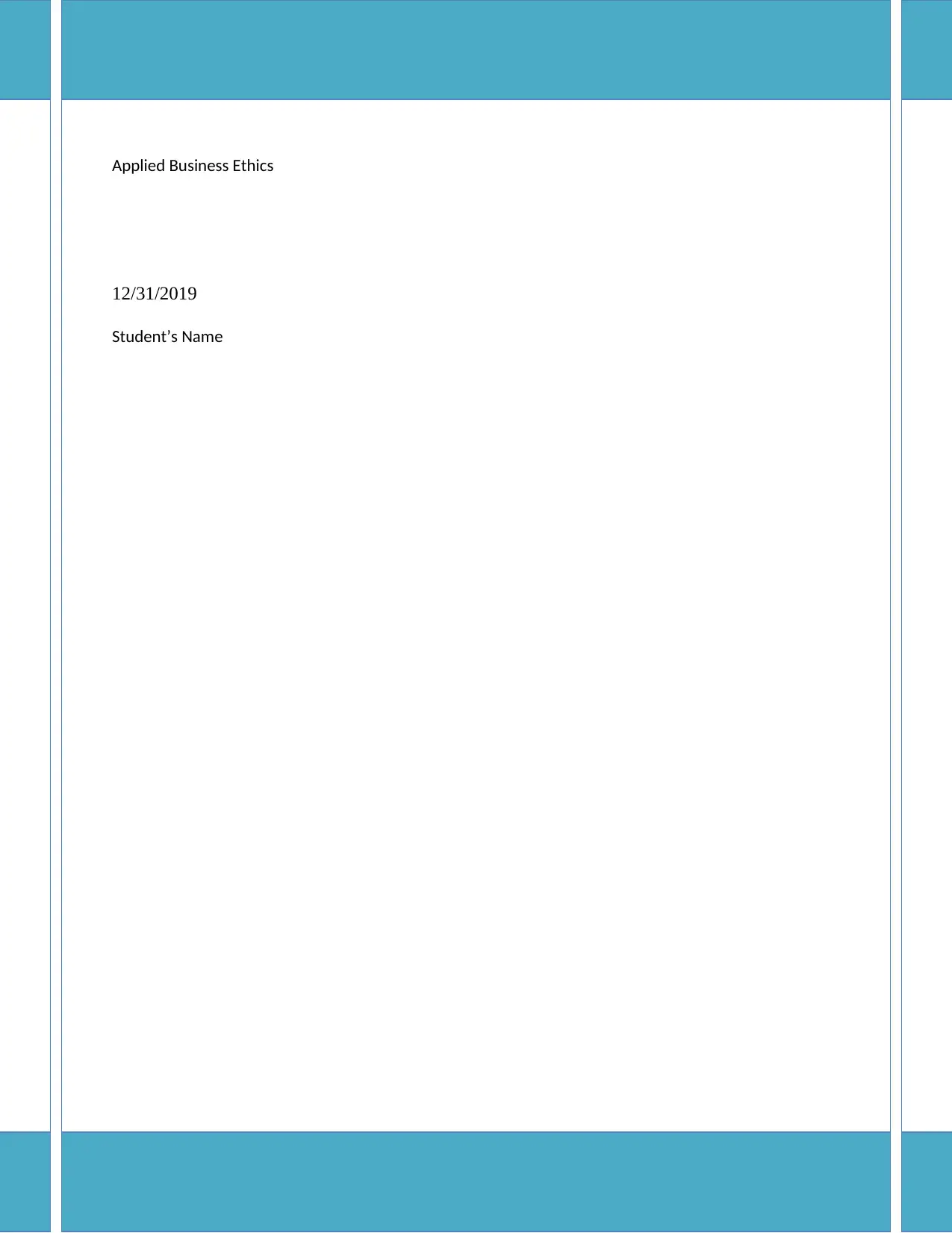
Running Head: BUSINESS AND CORPORATION LAW 0
Applied Business Ethics
12/31/2019
Student’s Name
Applied Business Ethics
12/31/2019
Student’s Name
Paraphrase This Document
Need a fresh take? Get an instant paraphrase of this document with our AI Paraphraser
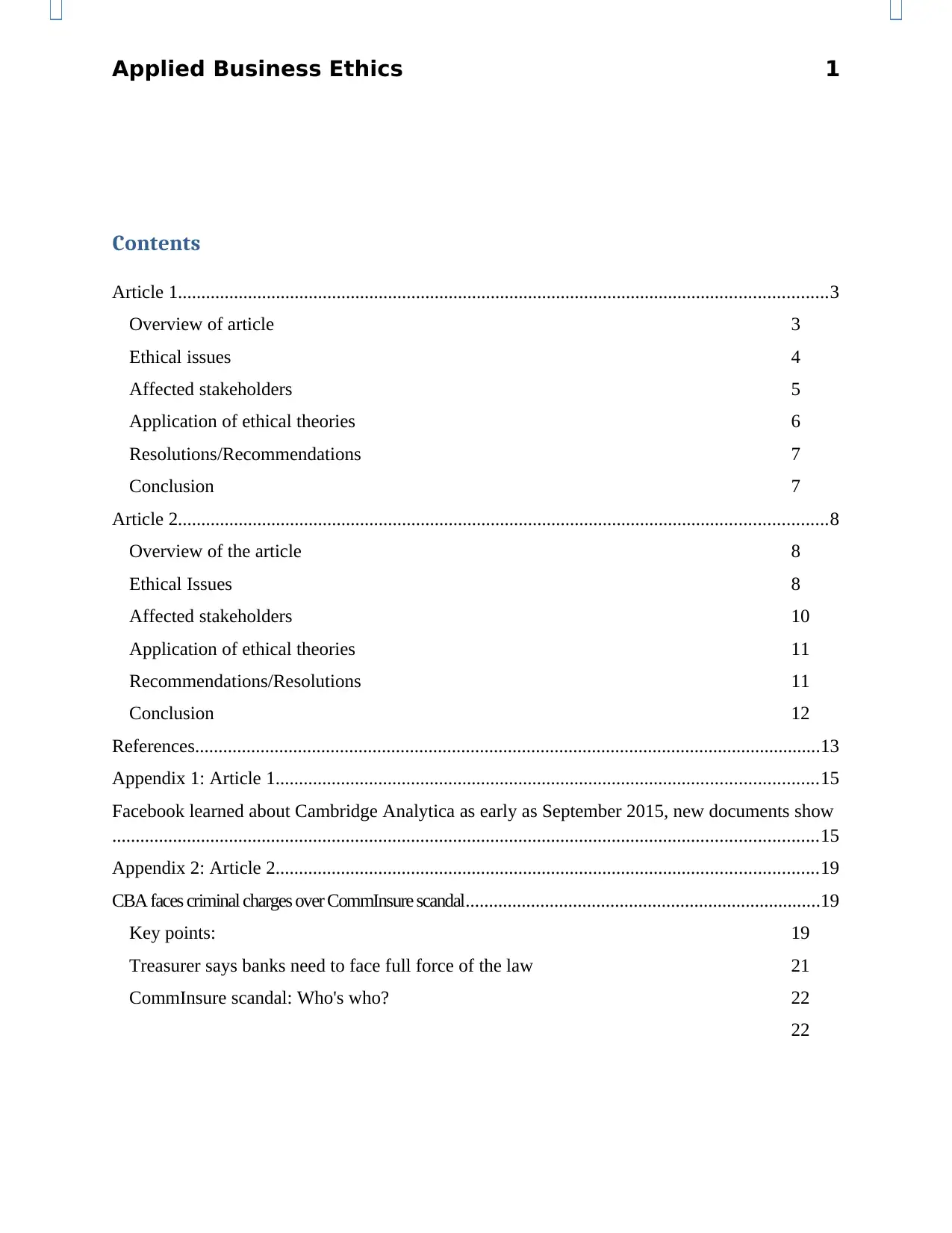
Applied Business Ethics 1
Contents
Article 1...........................................................................................................................................3
Overview of article 3
Ethical issues 4
Affected stakeholders 5
Application of ethical theories 6
Resolutions/Recommendations 7
Conclusion 7
Article 2...........................................................................................................................................8
Overview of the article 8
Ethical Issues 8
Affected stakeholders 10
Application of ethical theories 11
Recommendations/Resolutions 11
Conclusion 12
References......................................................................................................................................13
Appendix 1: Article 1....................................................................................................................15
Facebook learned about Cambridge Analytica as early as September 2015, new documents show
.......................................................................................................................................................15
Appendix 2: Article 2....................................................................................................................19
CBA faces criminal charges over CommInsure scandal............................................................................19
Key points: 19
Treasurer says banks need to face full force of the law 21
CommInsure scandal: Who's who? 22
22
Contents
Article 1...........................................................................................................................................3
Overview of article 3
Ethical issues 4
Affected stakeholders 5
Application of ethical theories 6
Resolutions/Recommendations 7
Conclusion 7
Article 2...........................................................................................................................................8
Overview of the article 8
Ethical Issues 8
Affected stakeholders 10
Application of ethical theories 11
Recommendations/Resolutions 11
Conclusion 12
References......................................................................................................................................13
Appendix 1: Article 1....................................................................................................................15
Facebook learned about Cambridge Analytica as early as September 2015, new documents show
.......................................................................................................................................................15
Appendix 2: Article 2....................................................................................................................19
CBA faces criminal charges over CommInsure scandal............................................................................19
Key points: 19
Treasurer says banks need to face full force of the law 21
CommInsure scandal: Who's who? 22
22
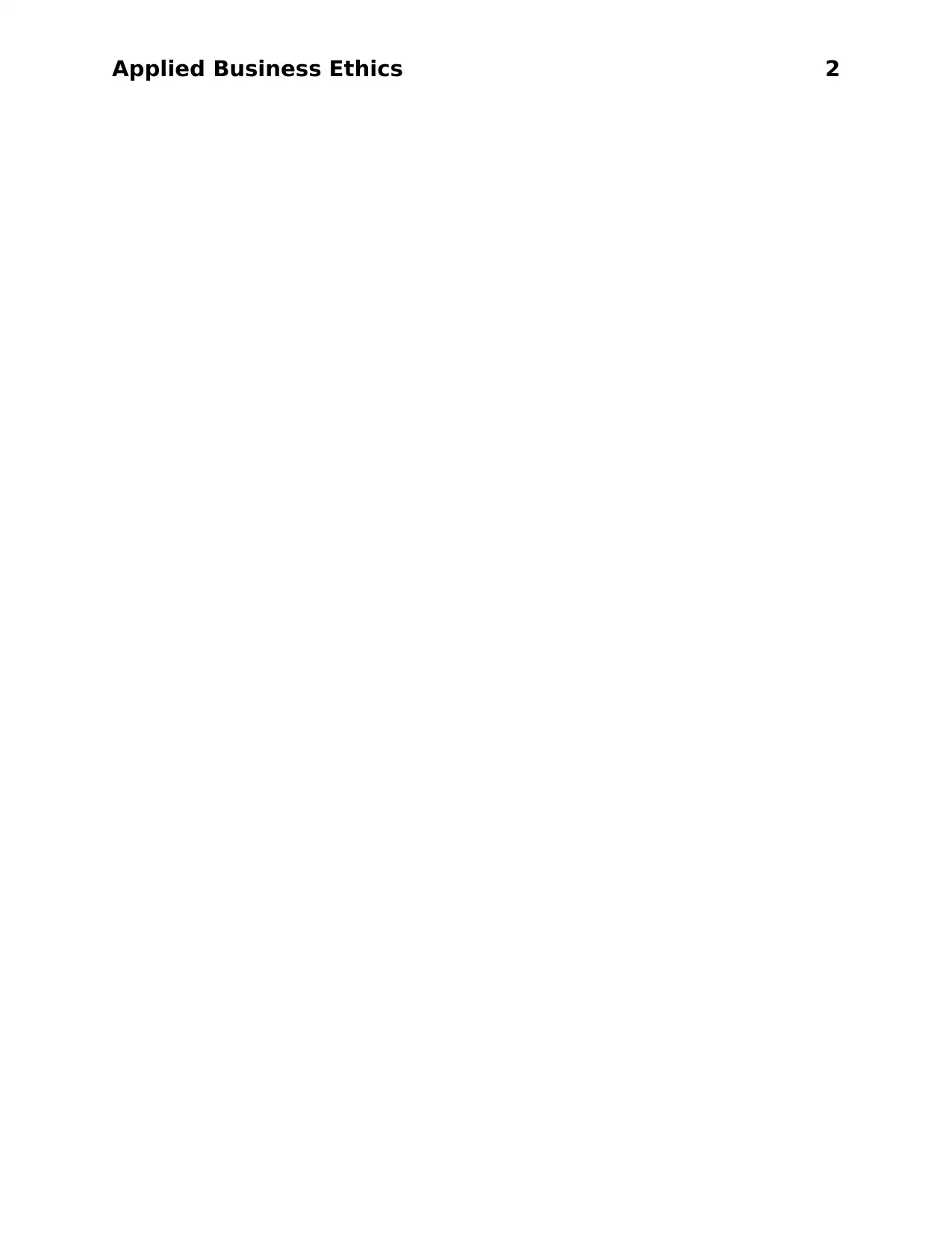
Applied Business Ethics 2
⊘ This is a preview!⊘
Do you want full access?
Subscribe today to unlock all pages.

Trusted by 1+ million students worldwide
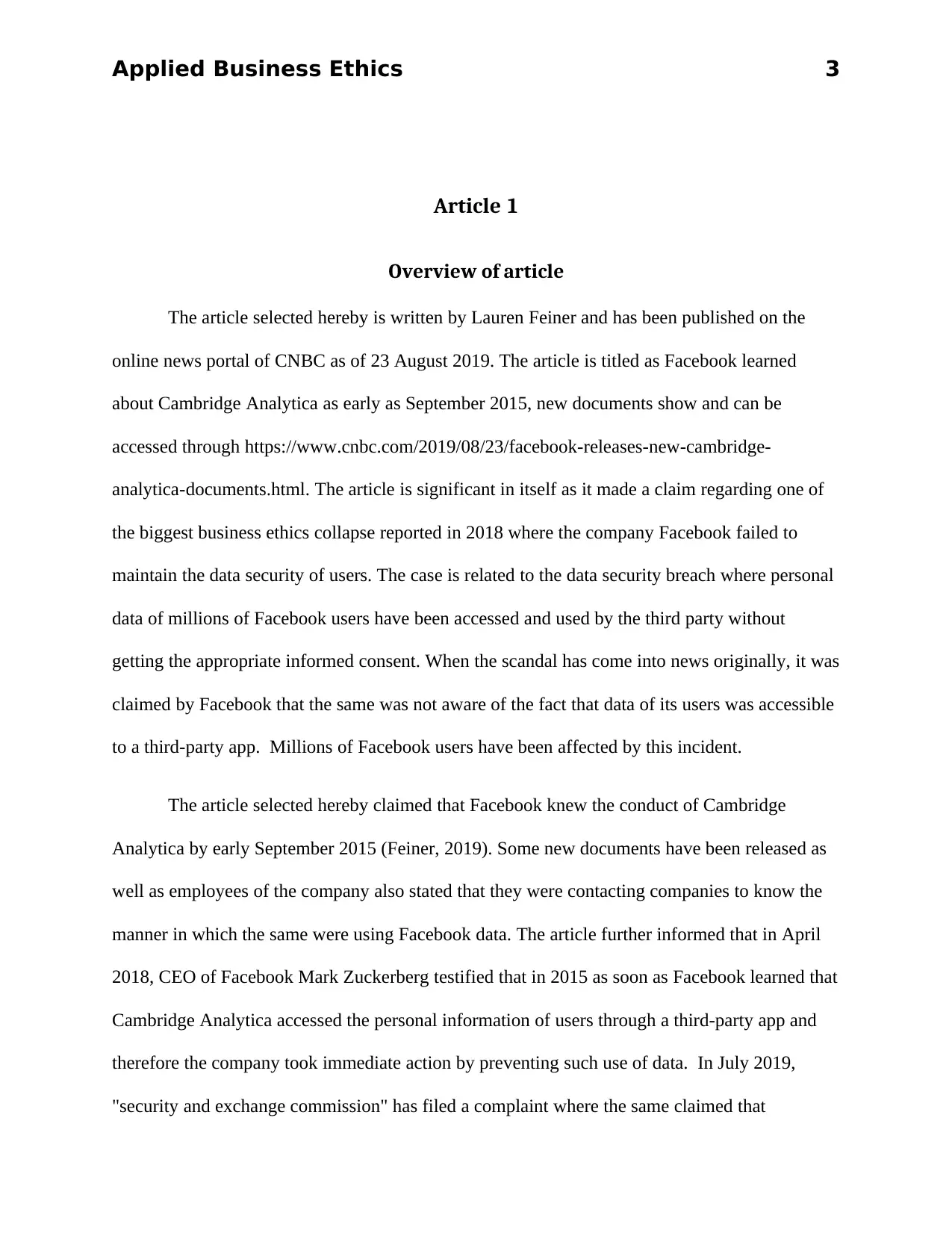
Applied Business Ethics 3
Article 1
Overview of article
The article selected hereby is written by Lauren Feiner and has been published on the
online news portal of CNBC as of 23 August 2019. The article is titled as Facebook learned
about Cambridge Analytica as early as September 2015, new documents show and can be
accessed through https://www.cnbc.com/2019/08/23/facebook-releases-new-cambridge-
analytica-documents.html. The article is significant in itself as it made a claim regarding one of
the biggest business ethics collapse reported in 2018 where the company Facebook failed to
maintain the data security of users. The case is related to the data security breach where personal
data of millions of Facebook users have been accessed and used by the third party without
getting the appropriate informed consent. When the scandal has come into news originally, it was
claimed by Facebook that the same was not aware of the fact that data of its users was accessible
to a third-party app. Millions of Facebook users have been affected by this incident.
The article selected hereby claimed that Facebook knew the conduct of Cambridge
Analytica by early September 2015 (Feiner, 2019). Some new documents have been released as
well as employees of the company also stated that they were contacting companies to know the
manner in which the same were using Facebook data. The article further informed that in April
2018, CEO of Facebook Mark Zuckerberg testified that in 2015 as soon as Facebook learned that
Cambridge Analytica accessed the personal information of users through a third-party app and
therefore the company took immediate action by preventing such use of data. In July 2019,
"security and exchange commission" has filed a complaint where the same claimed that
Article 1
Overview of article
The article selected hereby is written by Lauren Feiner and has been published on the
online news portal of CNBC as of 23 August 2019. The article is titled as Facebook learned
about Cambridge Analytica as early as September 2015, new documents show and can be
accessed through https://www.cnbc.com/2019/08/23/facebook-releases-new-cambridge-
analytica-documents.html. The article is significant in itself as it made a claim regarding one of
the biggest business ethics collapse reported in 2018 where the company Facebook failed to
maintain the data security of users. The case is related to the data security breach where personal
data of millions of Facebook users have been accessed and used by the third party without
getting the appropriate informed consent. When the scandal has come into news originally, it was
claimed by Facebook that the same was not aware of the fact that data of its users was accessible
to a third-party app. Millions of Facebook users have been affected by this incident.
The article selected hereby claimed that Facebook knew the conduct of Cambridge
Analytica by early September 2015 (Feiner, 2019). Some new documents have been released as
well as employees of the company also stated that they were contacting companies to know the
manner in which the same were using Facebook data. The article further informed that in April
2018, CEO of Facebook Mark Zuckerberg testified that in 2015 as soon as Facebook learned that
Cambridge Analytica accessed the personal information of users through a third-party app and
therefore the company took immediate action by preventing such use of data. In July 2019,
"security and exchange commission" has filed a complaint where the same claimed that
Paraphrase This Document
Need a fresh take? Get an instant paraphrase of this document with our AI Paraphraser
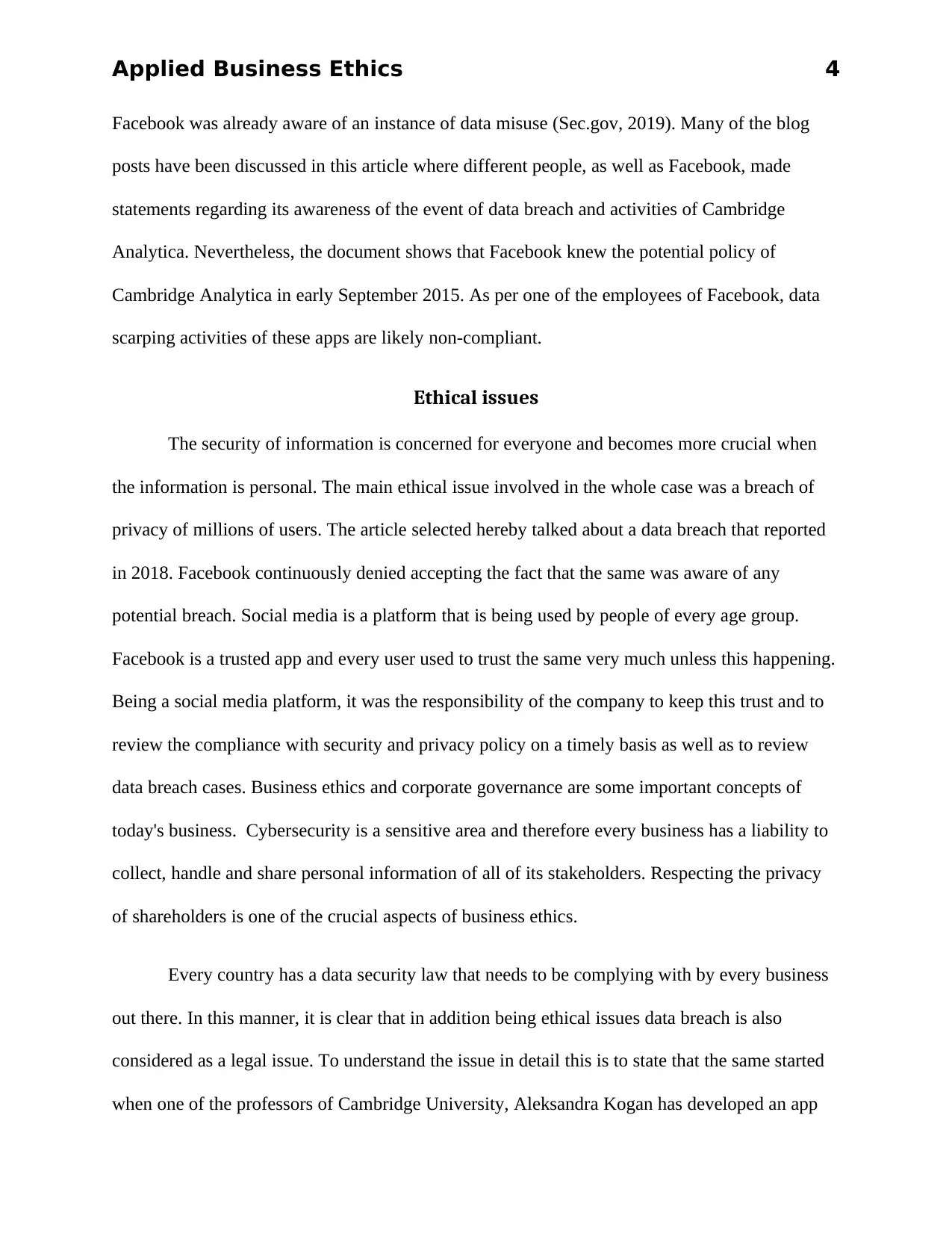
Applied Business Ethics 4
Facebook was already aware of an instance of data misuse (Sec.gov, 2019). Many of the blog
posts have been discussed in this article where different people, as well as Facebook, made
statements regarding its awareness of the event of data breach and activities of Cambridge
Analytica. Nevertheless, the document shows that Facebook knew the potential policy of
Cambridge Analytica in early September 2015. As per one of the employees of Facebook, data
scarping activities of these apps are likely non-compliant.
Ethical issues
The security of information is concerned for everyone and becomes more crucial when
the information is personal. The main ethical issue involved in the whole case was a breach of
privacy of millions of users. The article selected hereby talked about a data breach that reported
in 2018. Facebook continuously denied accepting the fact that the same was aware of any
potential breach. Social media is a platform that is being used by people of every age group.
Facebook is a trusted app and every user used to trust the same very much unless this happening.
Being a social media platform, it was the responsibility of the company to keep this trust and to
review the compliance with security and privacy policy on a timely basis as well as to review
data breach cases. Business ethics and corporate governance are some important concepts of
today's business. Cybersecurity is a sensitive area and therefore every business has a liability to
collect, handle and share personal information of all of its stakeholders. Respecting the privacy
of shareholders is one of the crucial aspects of business ethics.
Every country has a data security law that needs to be complying with by every business
out there. In this manner, it is clear that in addition being ethical issues data breach is also
considered as a legal issue. To understand the issue in detail this is to state that the same started
when one of the professors of Cambridge University, Aleksandra Kogan has developed an app
Facebook was already aware of an instance of data misuse (Sec.gov, 2019). Many of the blog
posts have been discussed in this article where different people, as well as Facebook, made
statements regarding its awareness of the event of data breach and activities of Cambridge
Analytica. Nevertheless, the document shows that Facebook knew the potential policy of
Cambridge Analytica in early September 2015. As per one of the employees of Facebook, data
scarping activities of these apps are likely non-compliant.
Ethical issues
The security of information is concerned for everyone and becomes more crucial when
the information is personal. The main ethical issue involved in the whole case was a breach of
privacy of millions of users. The article selected hereby talked about a data breach that reported
in 2018. Facebook continuously denied accepting the fact that the same was aware of any
potential breach. Social media is a platform that is being used by people of every age group.
Facebook is a trusted app and every user used to trust the same very much unless this happening.
Being a social media platform, it was the responsibility of the company to keep this trust and to
review the compliance with security and privacy policy on a timely basis as well as to review
data breach cases. Business ethics and corporate governance are some important concepts of
today's business. Cybersecurity is a sensitive area and therefore every business has a liability to
collect, handle and share personal information of all of its stakeholders. Respecting the privacy
of shareholders is one of the crucial aspects of business ethics.
Every country has a data security law that needs to be complying with by every business
out there. In this manner, it is clear that in addition being ethical issues data breach is also
considered as a legal issue. To understand the issue in detail this is to state that the same started
when one of the professors of Cambridge University, Aleksandra Kogan has developed an app
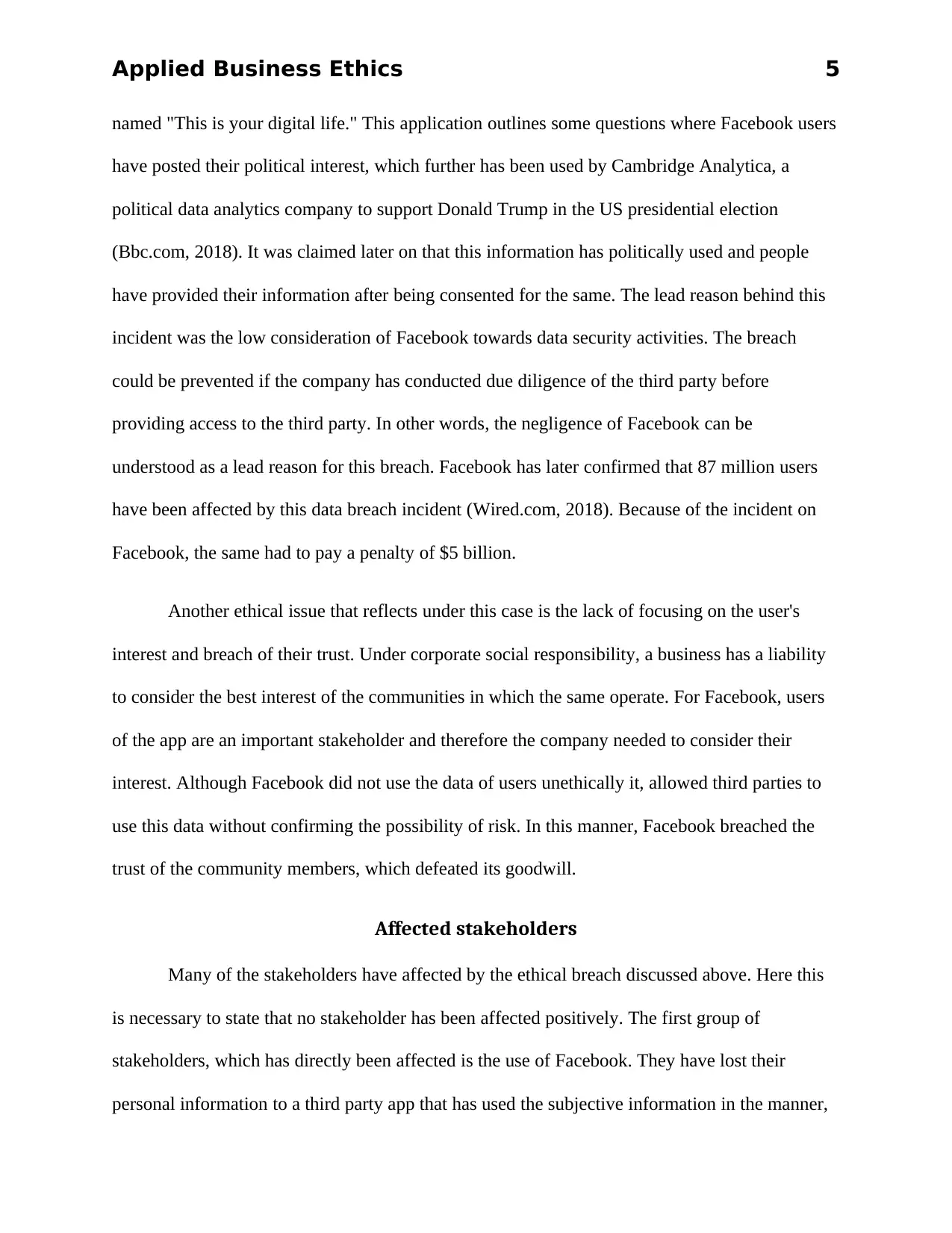
Applied Business Ethics 5
named "This is your digital life." This application outlines some questions where Facebook users
have posted their political interest, which further has been used by Cambridge Analytica, a
political data analytics company to support Donald Trump in the US presidential election
(Bbc.com, 2018). It was claimed later on that this information has politically used and people
have provided their information after being consented for the same. The lead reason behind this
incident was the low consideration of Facebook towards data security activities. The breach
could be prevented if the company has conducted due diligence of the third party before
providing access to the third party. In other words, the negligence of Facebook can be
understood as a lead reason for this breach. Facebook has later confirmed that 87 million users
have been affected by this data breach incident (Wired.com, 2018). Because of the incident on
Facebook, the same had to pay a penalty of $5 billion.
Another ethical issue that reflects under this case is the lack of focusing on the user's
interest and breach of their trust. Under corporate social responsibility, a business has a liability
to consider the best interest of the communities in which the same operate. For Facebook, users
of the app are an important stakeholder and therefore the company needed to consider their
interest. Although Facebook did not use the data of users unethically it, allowed third parties to
use this data without confirming the possibility of risk. In this manner, Facebook breached the
trust of the community members, which defeated its goodwill.
Affected stakeholders
Many of the stakeholders have affected by the ethical breach discussed above. Here this
is necessary to state that no stakeholder has been affected positively. The first group of
stakeholders, which has directly been affected is the use of Facebook. They have lost their
personal information to a third party app that has used the subjective information in the manner,
named "This is your digital life." This application outlines some questions where Facebook users
have posted their political interest, which further has been used by Cambridge Analytica, a
political data analytics company to support Donald Trump in the US presidential election
(Bbc.com, 2018). It was claimed later on that this information has politically used and people
have provided their information after being consented for the same. The lead reason behind this
incident was the low consideration of Facebook towards data security activities. The breach
could be prevented if the company has conducted due diligence of the third party before
providing access to the third party. In other words, the negligence of Facebook can be
understood as a lead reason for this breach. Facebook has later confirmed that 87 million users
have been affected by this data breach incident (Wired.com, 2018). Because of the incident on
Facebook, the same had to pay a penalty of $5 billion.
Another ethical issue that reflects under this case is the lack of focusing on the user's
interest and breach of their trust. Under corporate social responsibility, a business has a liability
to consider the best interest of the communities in which the same operate. For Facebook, users
of the app are an important stakeholder and therefore the company needed to consider their
interest. Although Facebook did not use the data of users unethically it, allowed third parties to
use this data without confirming the possibility of risk. In this manner, Facebook breached the
trust of the community members, which defeated its goodwill.
Affected stakeholders
Many of the stakeholders have affected by the ethical breach discussed above. Here this
is necessary to state that no stakeholder has been affected positively. The first group of
stakeholders, which has directly been affected is the use of Facebook. They have lost their
personal information to a third party app that has used the subjective information in the manner,
⊘ This is a preview!⊘
Do you want full access?
Subscribe today to unlock all pages.

Trusted by 1+ million students worldwide
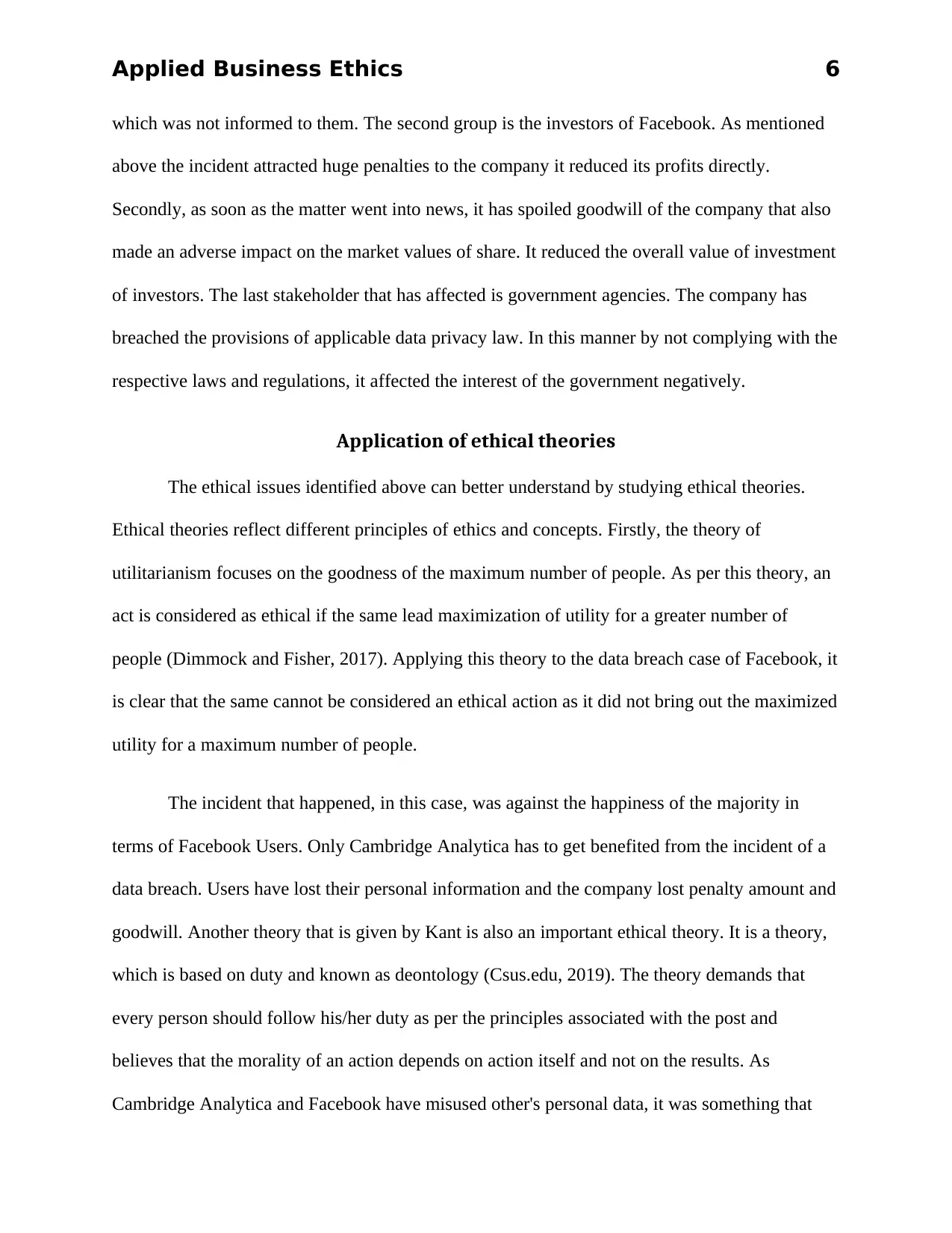
Applied Business Ethics 6
which was not informed to them. The second group is the investors of Facebook. As mentioned
above the incident attracted huge penalties to the company it reduced its profits directly.
Secondly, as soon as the matter went into news, it has spoiled goodwill of the company that also
made an adverse impact on the market values of share. It reduced the overall value of investment
of investors. The last stakeholder that has affected is government agencies. The company has
breached the provisions of applicable data privacy law. In this manner by not complying with the
respective laws and regulations, it affected the interest of the government negatively.
Application of ethical theories
The ethical issues identified above can better understand by studying ethical theories.
Ethical theories reflect different principles of ethics and concepts. Firstly, the theory of
utilitarianism focuses on the goodness of the maximum number of people. As per this theory, an
act is considered as ethical if the same lead maximization of utility for a greater number of
people (Dimmock and Fisher, 2017). Applying this theory to the data breach case of Facebook, it
is clear that the same cannot be considered an ethical action as it did not bring out the maximized
utility for a maximum number of people.
The incident that happened, in this case, was against the happiness of the majority in
terms of Facebook Users. Only Cambridge Analytica has to get benefited from the incident of a
data breach. Users have lost their personal information and the company lost penalty amount and
goodwill. Another theory that is given by Kant is also an important ethical theory. It is a theory,
which is based on duty and known as deontology (Csus.edu, 2019). The theory demands that
every person should follow his/her duty as per the principles associated with the post and
believes that the morality of an action depends on action itself and not on the results. As
Cambridge Analytica and Facebook have misused other's personal data, it was something that
which was not informed to them. The second group is the investors of Facebook. As mentioned
above the incident attracted huge penalties to the company it reduced its profits directly.
Secondly, as soon as the matter went into news, it has spoiled goodwill of the company that also
made an adverse impact on the market values of share. It reduced the overall value of investment
of investors. The last stakeholder that has affected is government agencies. The company has
breached the provisions of applicable data privacy law. In this manner by not complying with the
respective laws and regulations, it affected the interest of the government negatively.
Application of ethical theories
The ethical issues identified above can better understand by studying ethical theories.
Ethical theories reflect different principles of ethics and concepts. Firstly, the theory of
utilitarianism focuses on the goodness of the maximum number of people. As per this theory, an
act is considered as ethical if the same lead maximization of utility for a greater number of
people (Dimmock and Fisher, 2017). Applying this theory to the data breach case of Facebook, it
is clear that the same cannot be considered an ethical action as it did not bring out the maximized
utility for a maximum number of people.
The incident that happened, in this case, was against the happiness of the majority in
terms of Facebook Users. Only Cambridge Analytica has to get benefited from the incident of a
data breach. Users have lost their personal information and the company lost penalty amount and
goodwill. Another theory that is given by Kant is also an important ethical theory. It is a theory,
which is based on duty and known as deontology (Csus.edu, 2019). The theory demands that
every person should follow his/her duty as per the principles associated with the post and
believes that the morality of an action depends on action itself and not on the results. As
Cambridge Analytica and Facebook have misused other's personal data, it was something that
Paraphrase This Document
Need a fresh take? Get an instant paraphrase of this document with our AI Paraphraser
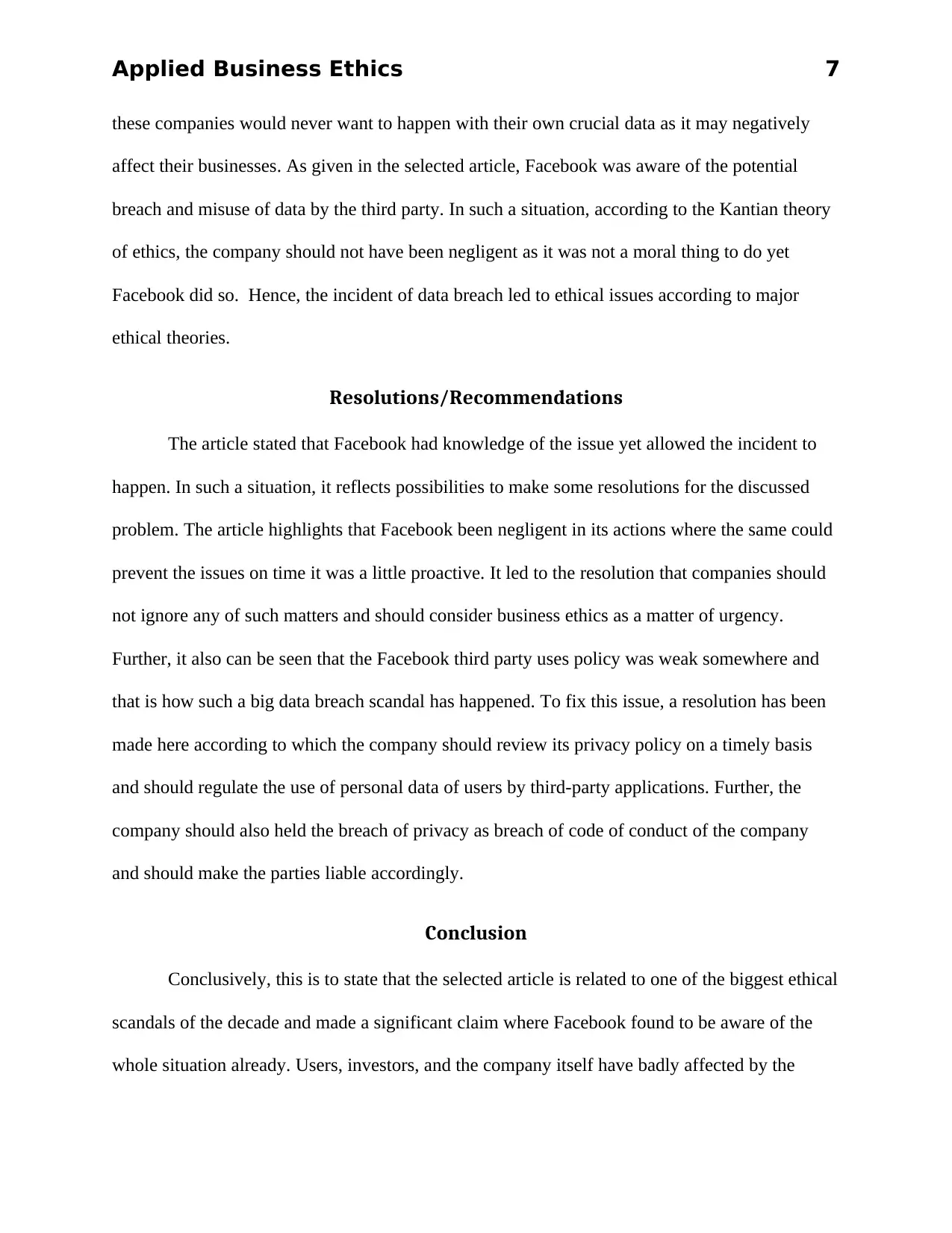
Applied Business Ethics 7
these companies would never want to happen with their own crucial data as it may negatively
affect their businesses. As given in the selected article, Facebook was aware of the potential
breach and misuse of data by the third party. In such a situation, according to the Kantian theory
of ethics, the company should not have been negligent as it was not a moral thing to do yet
Facebook did so. Hence, the incident of data breach led to ethical issues according to major
ethical theories.
Resolutions/Recommendations
The article stated that Facebook had knowledge of the issue yet allowed the incident to
happen. In such a situation, it reflects possibilities to make some resolutions for the discussed
problem. The article highlights that Facebook been negligent in its actions where the same could
prevent the issues on time it was a little proactive. It led to the resolution that companies should
not ignore any of such matters and should consider business ethics as a matter of urgency.
Further, it also can be seen that the Facebook third party uses policy was weak somewhere and
that is how such a big data breach scandal has happened. To fix this issue, a resolution has been
made here according to which the company should review its privacy policy on a timely basis
and should regulate the use of personal data of users by third-party applications. Further, the
company should also held the breach of privacy as breach of code of conduct of the company
and should make the parties liable accordingly.
Conclusion
Conclusively, this is to state that the selected article is related to one of the biggest ethical
scandals of the decade and made a significant claim where Facebook found to be aware of the
whole situation already. Users, investors, and the company itself have badly affected by the
these companies would never want to happen with their own crucial data as it may negatively
affect their businesses. As given in the selected article, Facebook was aware of the potential
breach and misuse of data by the third party. In such a situation, according to the Kantian theory
of ethics, the company should not have been negligent as it was not a moral thing to do yet
Facebook did so. Hence, the incident of data breach led to ethical issues according to major
ethical theories.
Resolutions/Recommendations
The article stated that Facebook had knowledge of the issue yet allowed the incident to
happen. In such a situation, it reflects possibilities to make some resolutions for the discussed
problem. The article highlights that Facebook been negligent in its actions where the same could
prevent the issues on time it was a little proactive. It led to the resolution that companies should
not ignore any of such matters and should consider business ethics as a matter of urgency.
Further, it also can be seen that the Facebook third party uses policy was weak somewhere and
that is how such a big data breach scandal has happened. To fix this issue, a resolution has been
made here according to which the company should review its privacy policy on a timely basis
and should regulate the use of personal data of users by third-party applications. Further, the
company should also held the breach of privacy as breach of code of conduct of the company
and should make the parties liable accordingly.
Conclusion
Conclusively, this is to state that the selected article is related to one of the biggest ethical
scandals of the decade and made a significant claim where Facebook found to be aware of the
whole situation already. Users, investors, and the company itself have badly affected by the
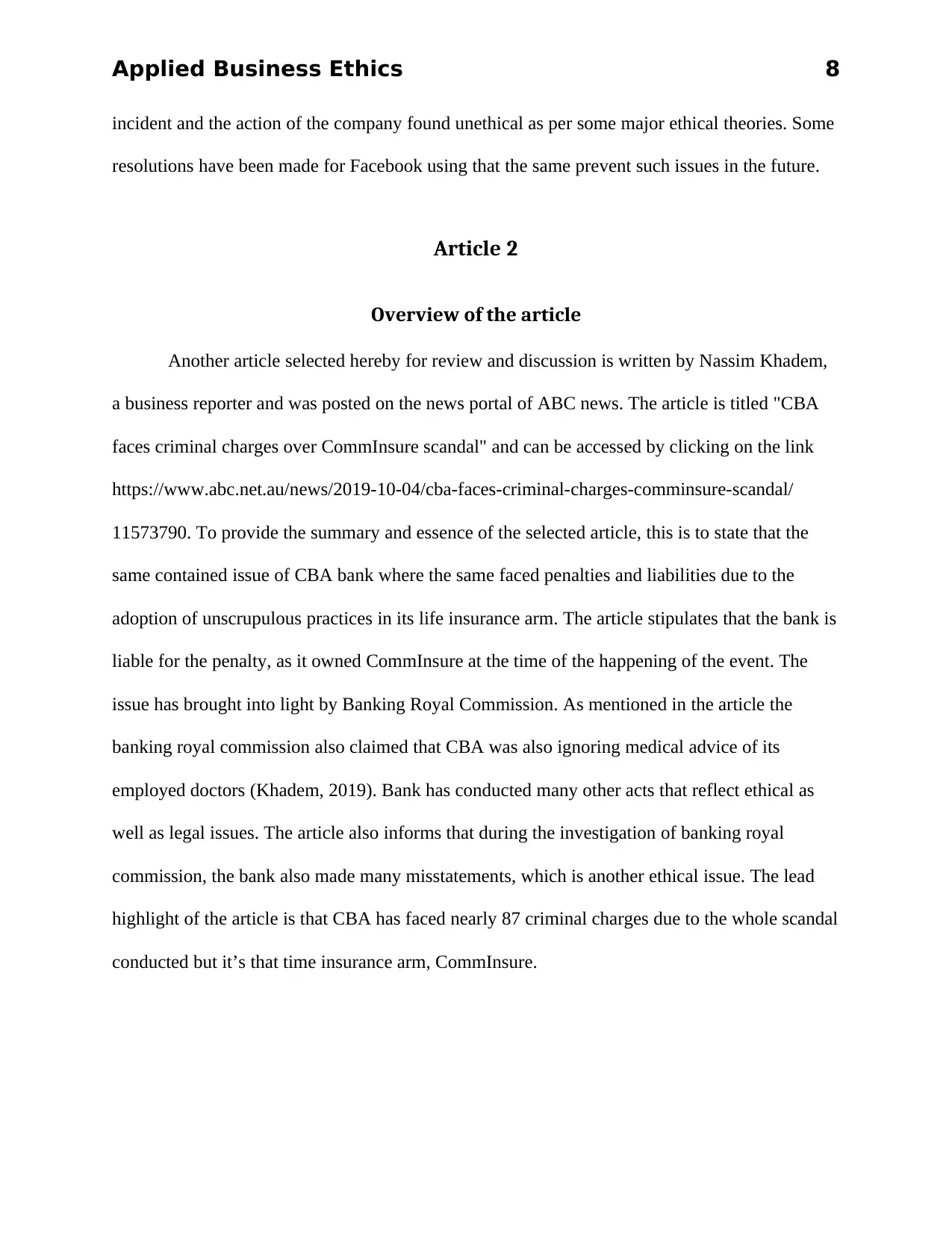
Applied Business Ethics 8
incident and the action of the company found unethical as per some major ethical theories. Some
resolutions have been made for Facebook using that the same prevent such issues in the future.
Article 2
Overview of the article
Another article selected hereby for review and discussion is written by Nassim Khadem,
a business reporter and was posted on the news portal of ABC news. The article is titled "CBA
faces criminal charges over CommInsure scandal" and can be accessed by clicking on the link
https://www.abc.net.au/news/2019-10-04/cba-faces-criminal-charges-comminsure-scandal/
11573790. To provide the summary and essence of the selected article, this is to state that the
same contained issue of CBA bank where the same faced penalties and liabilities due to the
adoption of unscrupulous practices in its life insurance arm. The article stipulates that the bank is
liable for the penalty, as it owned CommInsure at the time of the happening of the event. The
issue has brought into light by Banking Royal Commission. As mentioned in the article the
banking royal commission also claimed that CBA was also ignoring medical advice of its
employed doctors (Khadem, 2019). Bank has conducted many other acts that reflect ethical as
well as legal issues. The article also informs that during the investigation of banking royal
commission, the bank also made many misstatements, which is another ethical issue. The lead
highlight of the article is that CBA has faced nearly 87 criminal charges due to the whole scandal
conducted but it’s that time insurance arm, CommInsure.
incident and the action of the company found unethical as per some major ethical theories. Some
resolutions have been made for Facebook using that the same prevent such issues in the future.
Article 2
Overview of the article
Another article selected hereby for review and discussion is written by Nassim Khadem,
a business reporter and was posted on the news portal of ABC news. The article is titled "CBA
faces criminal charges over CommInsure scandal" and can be accessed by clicking on the link
https://www.abc.net.au/news/2019-10-04/cba-faces-criminal-charges-comminsure-scandal/
11573790. To provide the summary and essence of the selected article, this is to state that the
same contained issue of CBA bank where the same faced penalties and liabilities due to the
adoption of unscrupulous practices in its life insurance arm. The article stipulates that the bank is
liable for the penalty, as it owned CommInsure at the time of the happening of the event. The
issue has brought into light by Banking Royal Commission. As mentioned in the article the
banking royal commission also claimed that CBA was also ignoring medical advice of its
employed doctors (Khadem, 2019). Bank has conducted many other acts that reflect ethical as
well as legal issues. The article also informs that during the investigation of banking royal
commission, the bank also made many misstatements, which is another ethical issue. The lead
highlight of the article is that CBA has faced nearly 87 criminal charges due to the whole scandal
conducted but it’s that time insurance arm, CommInsure.
⊘ This is a preview!⊘
Do you want full access?
Subscribe today to unlock all pages.

Trusted by 1+ million students worldwide
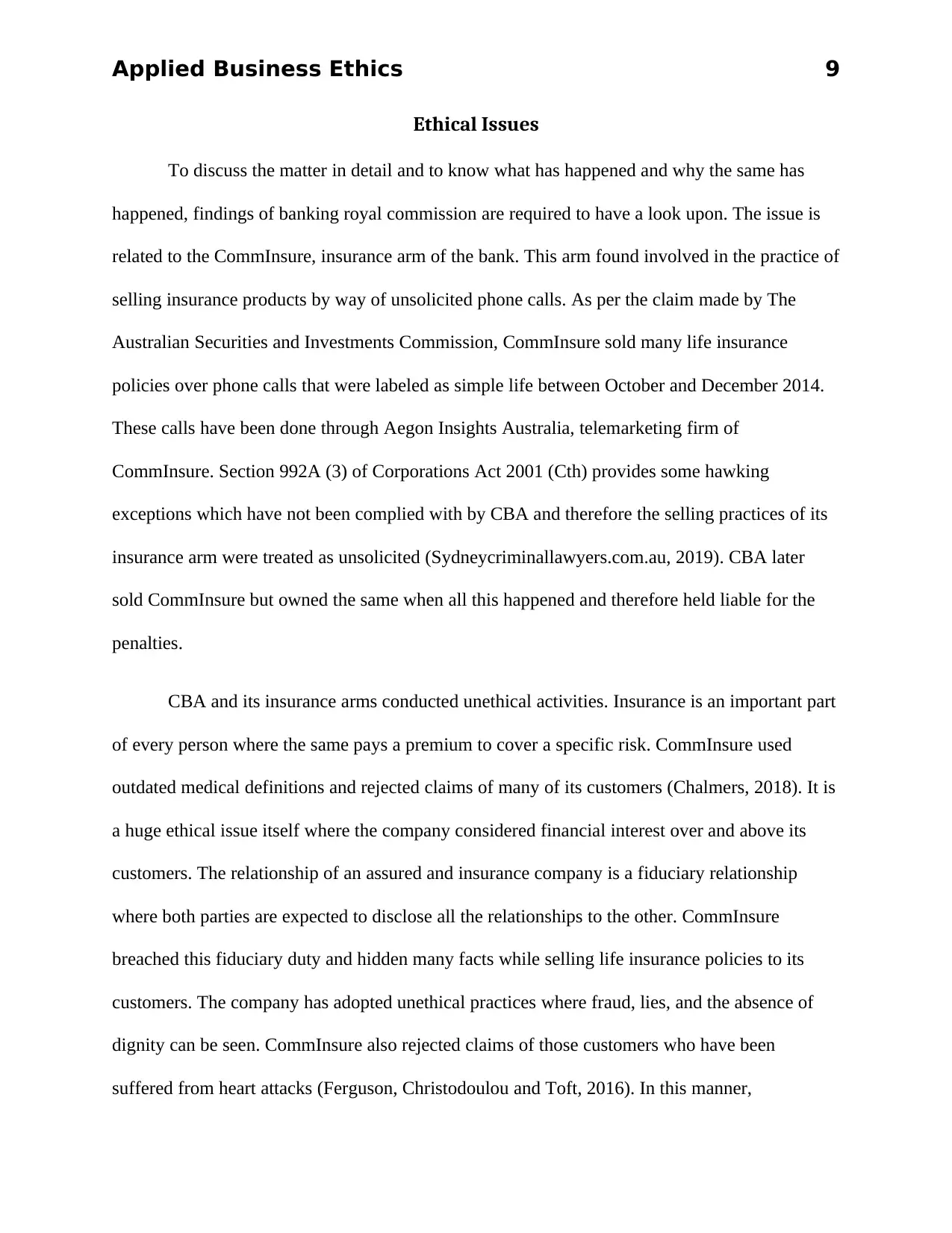
Applied Business Ethics 9
Ethical Issues
To discuss the matter in detail and to know what has happened and why the same has
happened, findings of banking royal commission are required to have a look upon. The issue is
related to the CommInsure, insurance arm of the bank. This arm found involved in the practice of
selling insurance products by way of unsolicited phone calls. As per the claim made by The
Australian Securities and Investments Commission, CommInsure sold many life insurance
policies over phone calls that were labeled as simple life between October and December 2014.
These calls have been done through Aegon Insights Australia, telemarketing firm of
CommInsure. Section 992A (3) of Corporations Act 2001 (Cth) provides some hawking
exceptions which have not been complied with by CBA and therefore the selling practices of its
insurance arm were treated as unsolicited (Sydneycriminallawyers.com.au, 2019). CBA later
sold CommInsure but owned the same when all this happened and therefore held liable for the
penalties.
CBA and its insurance arms conducted unethical activities. Insurance is an important part
of every person where the same pays a premium to cover a specific risk. CommInsure used
outdated medical definitions and rejected claims of many of its customers (Chalmers, 2018). It is
a huge ethical issue itself where the company considered financial interest over and above its
customers. The relationship of an assured and insurance company is a fiduciary relationship
where both parties are expected to disclose all the relationships to the other. CommInsure
breached this fiduciary duty and hidden many facts while selling life insurance policies to its
customers. The company has adopted unethical practices where fraud, lies, and the absence of
dignity can be seen. CommInsure also rejected claims of those customers who have been
suffered from heart attacks (Ferguson, Christodoulou and Toft, 2016). In this manner,
Ethical Issues
To discuss the matter in detail and to know what has happened and why the same has
happened, findings of banking royal commission are required to have a look upon. The issue is
related to the CommInsure, insurance arm of the bank. This arm found involved in the practice of
selling insurance products by way of unsolicited phone calls. As per the claim made by The
Australian Securities and Investments Commission, CommInsure sold many life insurance
policies over phone calls that were labeled as simple life between October and December 2014.
These calls have been done through Aegon Insights Australia, telemarketing firm of
CommInsure. Section 992A (3) of Corporations Act 2001 (Cth) provides some hawking
exceptions which have not been complied with by CBA and therefore the selling practices of its
insurance arm were treated as unsolicited (Sydneycriminallawyers.com.au, 2019). CBA later
sold CommInsure but owned the same when all this happened and therefore held liable for the
penalties.
CBA and its insurance arms conducted unethical activities. Insurance is an important part
of every person where the same pays a premium to cover a specific risk. CommInsure used
outdated medical definitions and rejected claims of many of its customers (Chalmers, 2018). It is
a huge ethical issue itself where the company considered financial interest over and above its
customers. The relationship of an assured and insurance company is a fiduciary relationship
where both parties are expected to disclose all the relationships to the other. CommInsure
breached this fiduciary duty and hidden many facts while selling life insurance policies to its
customers. The company has adopted unethical practices where fraud, lies, and the absence of
dignity can be seen. CommInsure also rejected claims of those customers who have been
suffered from heart attacks (Ferguson, Christodoulou and Toft, 2016). In this manner,
Paraphrase This Document
Need a fresh take? Get an instant paraphrase of this document with our AI Paraphraser
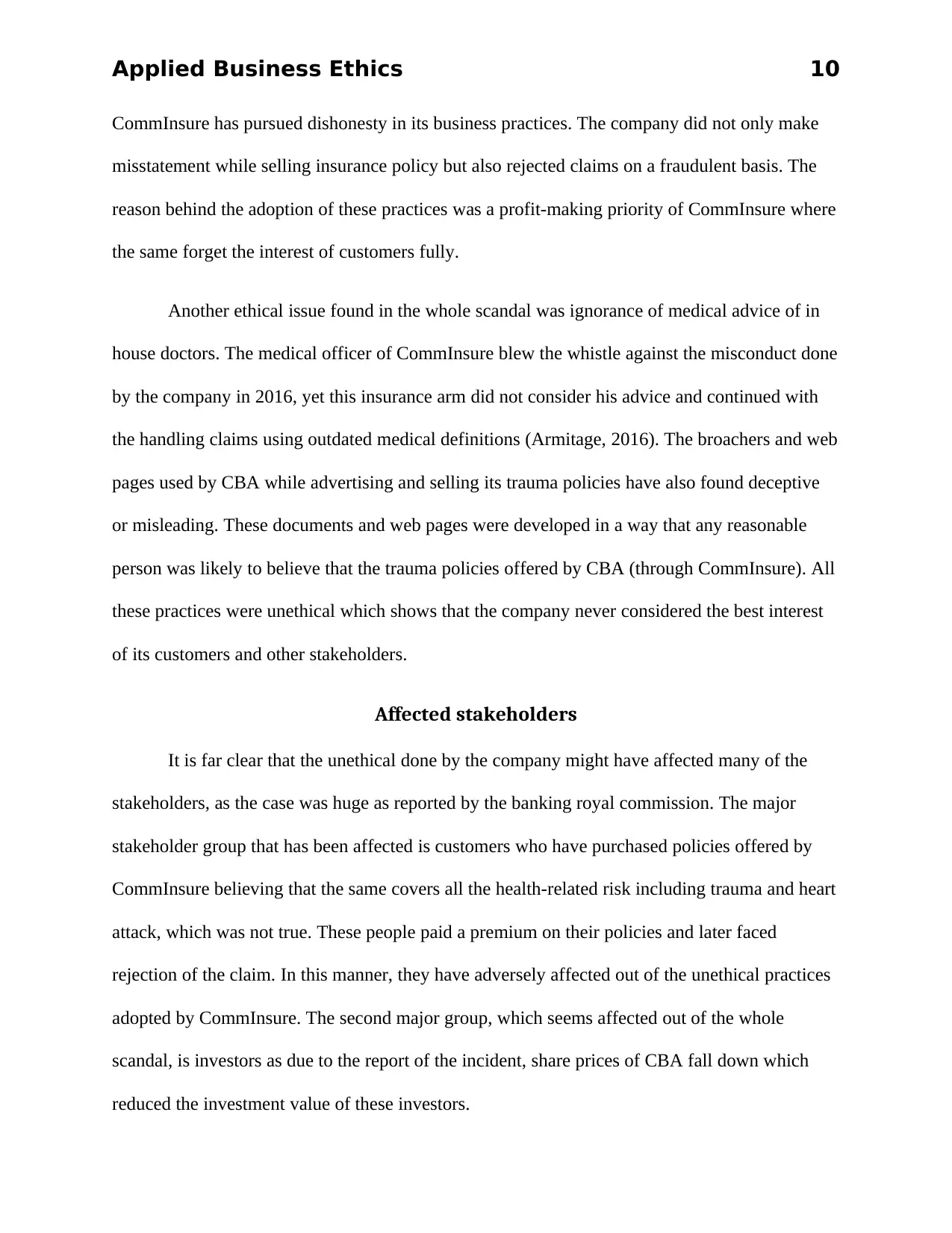
Applied Business Ethics 10
CommInsure has pursued dishonesty in its business practices. The company did not only make
misstatement while selling insurance policy but also rejected claims on a fraudulent basis. The
reason behind the adoption of these practices was a profit-making priority of CommInsure where
the same forget the interest of customers fully.
Another ethical issue found in the whole scandal was ignorance of medical advice of in
house doctors. The medical officer of CommInsure blew the whistle against the misconduct done
by the company in 2016, yet this insurance arm did not consider his advice and continued with
the handling claims using outdated medical definitions (Armitage, 2016). The broachers and web
pages used by CBA while advertising and selling its trauma policies have also found deceptive
or misleading. These documents and web pages were developed in a way that any reasonable
person was likely to believe that the trauma policies offered by CBA (through CommInsure). All
these practices were unethical which shows that the company never considered the best interest
of its customers and other stakeholders.
Affected stakeholders
It is far clear that the unethical done by the company might have affected many of the
stakeholders, as the case was huge as reported by the banking royal commission. The major
stakeholder group that has been affected is customers who have purchased policies offered by
CommInsure believing that the same covers all the health-related risk including trauma and heart
attack, which was not true. These people paid a premium on their policies and later faced
rejection of the claim. In this manner, they have adversely affected out of the unethical practices
adopted by CommInsure. The second major group, which seems affected out of the whole
scandal, is investors as due to the report of the incident, share prices of CBA fall down which
reduced the investment value of these investors.
CommInsure has pursued dishonesty in its business practices. The company did not only make
misstatement while selling insurance policy but also rejected claims on a fraudulent basis. The
reason behind the adoption of these practices was a profit-making priority of CommInsure where
the same forget the interest of customers fully.
Another ethical issue found in the whole scandal was ignorance of medical advice of in
house doctors. The medical officer of CommInsure blew the whistle against the misconduct done
by the company in 2016, yet this insurance arm did not consider his advice and continued with
the handling claims using outdated medical definitions (Armitage, 2016). The broachers and web
pages used by CBA while advertising and selling its trauma policies have also found deceptive
or misleading. These documents and web pages were developed in a way that any reasonable
person was likely to believe that the trauma policies offered by CBA (through CommInsure). All
these practices were unethical which shows that the company never considered the best interest
of its customers and other stakeholders.
Affected stakeholders
It is far clear that the unethical done by the company might have affected many of the
stakeholders, as the case was huge as reported by the banking royal commission. The major
stakeholder group that has been affected is customers who have purchased policies offered by
CommInsure believing that the same covers all the health-related risk including trauma and heart
attack, which was not true. These people paid a premium on their policies and later faced
rejection of the claim. In this manner, they have adversely affected out of the unethical practices
adopted by CommInsure. The second major group, which seems affected out of the whole
scandal, is investors as due to the report of the incident, share prices of CBA fall down which
reduced the investment value of these investors.
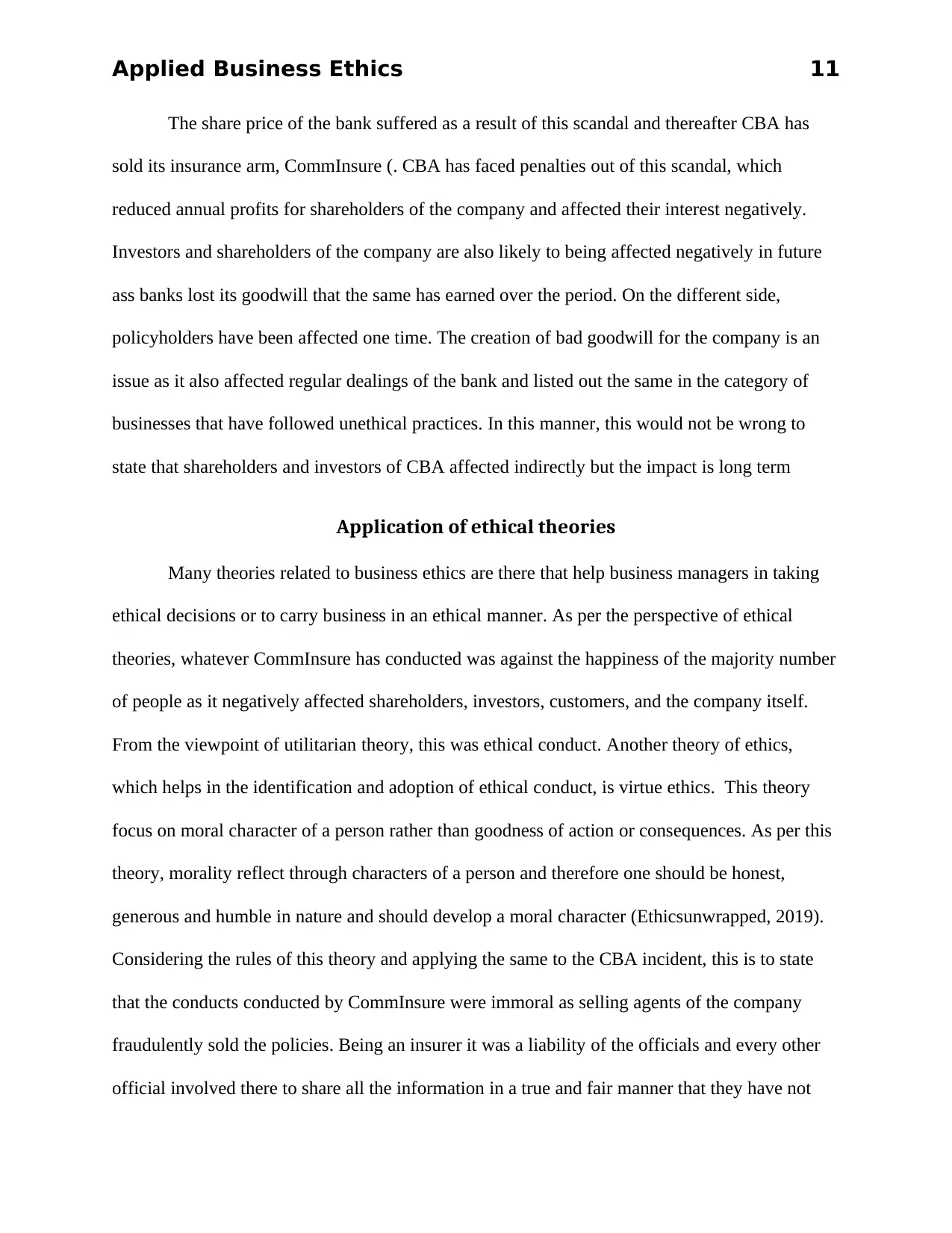
Applied Business Ethics 11
The share price of the bank suffered as a result of this scandal and thereafter CBA has
sold its insurance arm, CommInsure (. CBA has faced penalties out of this scandal, which
reduced annual profits for shareholders of the company and affected their interest negatively.
Investors and shareholders of the company are also likely to being affected negatively in future
ass banks lost its goodwill that the same has earned over the period. On the different side,
policyholders have been affected one time. The creation of bad goodwill for the company is an
issue as it also affected regular dealings of the bank and listed out the same in the category of
businesses that have followed unethical practices. In this manner, this would not be wrong to
state that shareholders and investors of CBA affected indirectly but the impact is long term
Application of ethical theories
Many theories related to business ethics are there that help business managers in taking
ethical decisions or to carry business in an ethical manner. As per the perspective of ethical
theories, whatever CommInsure has conducted was against the happiness of the majority number
of people as it negatively affected shareholders, investors, customers, and the company itself.
From the viewpoint of utilitarian theory, this was ethical conduct. Another theory of ethics,
which helps in the identification and adoption of ethical conduct, is virtue ethics. This theory
focus on moral character of a person rather than goodness of action or consequences. As per this
theory, morality reflect through characters of a person and therefore one should be honest,
generous and humble in nature and should develop a moral character (Ethicsunwrapped, 2019).
Considering the rules of this theory and applying the same to the CBA incident, this is to state
that the conducts conducted by CommInsure were immoral as selling agents of the company
fraudulently sold the policies. Being an insurer it was a liability of the officials and every other
official involved there to share all the information in a true and fair manner that they have not
The share price of the bank suffered as a result of this scandal and thereafter CBA has
sold its insurance arm, CommInsure (. CBA has faced penalties out of this scandal, which
reduced annual profits for shareholders of the company and affected their interest negatively.
Investors and shareholders of the company are also likely to being affected negatively in future
ass banks lost its goodwill that the same has earned over the period. On the different side,
policyholders have been affected one time. The creation of bad goodwill for the company is an
issue as it also affected regular dealings of the bank and listed out the same in the category of
businesses that have followed unethical practices. In this manner, this would not be wrong to
state that shareholders and investors of CBA affected indirectly but the impact is long term
Application of ethical theories
Many theories related to business ethics are there that help business managers in taking
ethical decisions or to carry business in an ethical manner. As per the perspective of ethical
theories, whatever CommInsure has conducted was against the happiness of the majority number
of people as it negatively affected shareholders, investors, customers, and the company itself.
From the viewpoint of utilitarian theory, this was ethical conduct. Another theory of ethics,
which helps in the identification and adoption of ethical conduct, is virtue ethics. This theory
focus on moral character of a person rather than goodness of action or consequences. As per this
theory, morality reflect through characters of a person and therefore one should be honest,
generous and humble in nature and should develop a moral character (Ethicsunwrapped, 2019).
Considering the rules of this theory and applying the same to the CBA incident, this is to state
that the conducts conducted by CommInsure were immoral as selling agents of the company
fraudulently sold the policies. Being an insurer it was a liability of the officials and every other
official involved there to share all the information in a true and fair manner that they have not
⊘ This is a preview!⊘
Do you want full access?
Subscribe today to unlock all pages.

Trusted by 1+ million students worldwide
1 out of 24
Related Documents
Your All-in-One AI-Powered Toolkit for Academic Success.
+13062052269
info@desklib.com
Available 24*7 on WhatsApp / Email
![[object Object]](/_next/static/media/star-bottom.7253800d.svg)
Unlock your academic potential
Copyright © 2020–2026 A2Z Services. All Rights Reserved. Developed and managed by ZUCOL.





